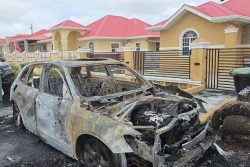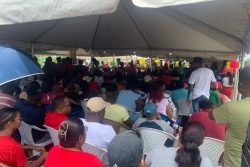Recently I was sorting through old files and papers in my library in the process of sending them for deposit at the Special Collections Division of the UWI Library in St Augustine. I came across a batch of obituaries of relatives of mine published in the West India Circular magazine – my grandfather, my grandmother and their eldest son, my uncle Arthur.
They were important people in my life long ago but I had not thought about them very much for decades. It was fascinating to be reminded of what noteworthy and vividly interesting lives they led. Here are extracts from their obituaries to give a flavour.
Dr W M McDonald
‘Dr W M McDonald, OBE, died recently at his residence at Cliff House, Hodges Bay, Antigua, in his 82nd year. Dr McDonald, who was born in Antigua, received his medical education at St Bartholomew’s Hospital, London. He qualified in 1896, and returned to Antigua, where he was in active practice for more than 50 years. It was he who discovered and reported the presence of ankylostomiasis (hookworm) in Antigua in 1899. He did much valuable work on malarial parasitology, and his work on malarial nephritis particularly in association with quartan malaria attracted much attention at the London School of Tropical Medicine and elsewhere. He loved his profession, and gave a lifetime of devoted and unstinted service to his patients of all classes. Long after he had retired from Government work and private practice, mothers would persist in bringing sick children to him from the farthermost villages, in cars, carts, or on donkeys, and sometimes they would walk miles on foot carrying a sick child. He never refused his services. He was greatly loved by all, and particularly by the humble people of the villages whom he delighted to serve.’
Mrs Hilda McDonald
 ‘Mrs McDonald – a brilliant partner to her doctor husband – was a great personality and public figure. She was at one time a Member of the Antigua Legislative Council and the British Council representative in Antigua. During the Second World War she was an information officer and an announcer over Radio Antigua. Yet she may be best remembered by Antiguans as the author of a collection of lovely poems about this island, entitled Sunflakes and Stardust – about her home at Hodges Bay, Shirley Heights, Lord Nelson, and perhaps the most charming of all, the guide to the fishing bank or the dockyard, “Where the trees come down from Clarence and the chimney meets the wall.”’
‘Mrs McDonald – a brilliant partner to her doctor husband – was a great personality and public figure. She was at one time a Member of the Antigua Legislative Council and the British Council representative in Antigua. During the Second World War she was an information officer and an announcer over Radio Antigua. Yet she may be best remembered by Antiguans as the author of a collection of lovely poems about this island, entitled Sunflakes and Stardust – about her home at Hodges Bay, Shirley Heights, Lord Nelson, and perhaps the most charming of all, the guide to the fishing bank or the dockyard, “Where the trees come down from Clarence and the chimney meets the wall.”’
Air Marshal Sir Arthur McDonald
‘In 1937 Arthur McDonald was put in charge of the so-called Biggin Hill experiment. This was vital in developing the system of ground-to-air control without which the RAF could not have won the Battle of Britain.
‘McDonald was born in South Africa and grew up in St Kitts and Antigua. Later he obtained an Engineering degree at Peterhouse, Cambridge, and in 1942 joined the RAF.
‘When Sir Henry Tizard and his colleagues first demonstrated the potentialities of radar (or Radio Direction Finding as it was then called), there were many who remained to be convinced of its practical application to air defence – and indeed of the real validity of any air defence (“The bomber will always get through,” Stanley Baldwin, among others, was quoted as saying). Among those who maintained faith in its practicality was Lord Swinton, the far-seeing Air Minister.
‘On the airfield at Biggin Hill there was established an experimental flight of fighters designed to assess the merits, not only of radar, but of the whole concept of ground command and control, of which Air Chief Marshal Hugh Dowding, the recently appointed Commander-in-Chief of Fighter Command, was such a fervent advocate. Swinton told McDonald at the time of the experiments: “I hope you realize that the whole future of this country depends on the results which you obtain at Biggin Hill.”
‘The results produced convinced even the most skeptical of observers. The vital radar stations, command and control installations and a barely adequate number of modern fighter aircraft were provided in the nick of time before the outbreak of the Second World War. For his contribution to that success McDonald was awarded the Air Force Cross.
‘He repeated that success in 1941 with the so-called Duxford flare path. At the time enemy intruder aircraft were proving a real menace to our night-flying operations owing to the intensity of airfield lighting which such operations demanded. McDonald’s Duxford flare path was so cleverly designed as to be invisible to the enemy, so much so that during its use only one aircraft was shot down when landing at Duxford, and that because the pilot, a visitor, insisted on using the normal landing lights.
‘Unusually McDonald combined high technical ability with a real gift for dealing with human beings at all levels. Not only was he eventually to become Air Member for Personnel in the Air Council but he was popular and respected in a number of service appointments mixing with international organisations and people. These included being AOC of Training at air headquarters India and Commander-in-Chief of the fledgling Pakistani Air Force.’
I am aware that close interest in these lives belongs to me and not to others who have their own beloved gallery of ancestral members they recall and honour. But that is the point I wish to make in recording these lives which were once so close to mine. Everyone is similarly situated. Everyone has memories of people they revered and remember vividly. And everyone will experience what I am experiencing now. It makes me sad to read the pieces – they bring back many memories and they make me think of how lives like theirs, so fruitful and important in their time, are entirely forgotten as time passes and their own immediate family members fade away in their turn. My own children will hardly know of them and then their children will know nothing. Yet they were such fine people who lived lives full of achievement and goodness and contributed so much to others. When I used to visit Antigua, for instance, I still came across old people who remembered being attended to with unforgettable compassion by my grandfather when they were little children. “And he even gave me sweets and a shiny new shilling when I left with my mother” one man, an old taxi driver from the airport, told me once. But it all disappears so quickly and it makes me sad.
Passing time. Fading memories. Generations which each has its own responsibilities and dreams. What was so wondrously wrought falling soon enough into obscurity and then oblivion. Persons who once shone and captivated retreating into the hastening shadows of the years. They vanish without trace. Nothing much can be done about it. Except perhaps leave a note or two for the grandchildren and great grandchildren to read and pass on if they ever pause a moment in the whirligig of life to consider, what once was.






